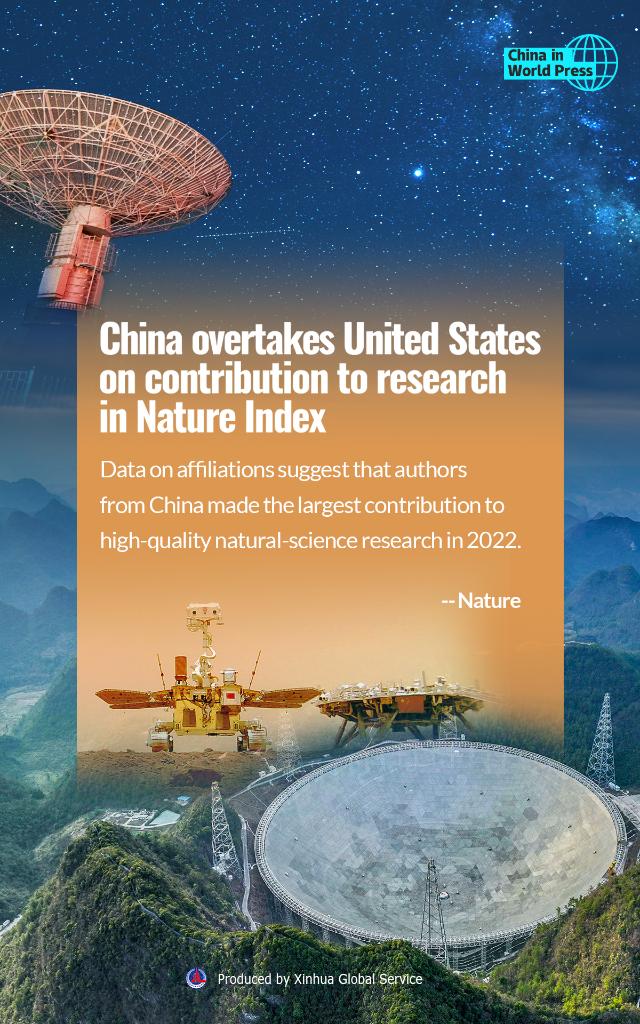World Sci-tech Development Benefiting from China's Contribution

Edited by QI Liming
China was the biggest contributor to research in major science journals and replaced the U.S. in top position for the first time in 2022, according to data from Nature Index recorded since 2014.
Quantity on par with quality
The quantity of Chinese research has risen rapidly since 2010, and some may wonder whether the explosion in the quantity of research was accompanied by improving quality.
According to The Conversation, while a country's scientific prowess is somewhat difficult to quantify, the amount of money spent on scientific research, the number of scholarly papers published and the quality of those papers are good indicators.
Taken together, these measures suggest that China is now no longer an imitator nor producer of only low-quality science. China is now a scientific power on par with the U.S. and Europe, both in quantity and in quality.
According to Caroline Wagner, Chair in International Affairs of Ohio State University, to quantify China's scientific strength, investigations carried out by her team found that Chinese research was surprisingly novel and creative.
"The Chinese research [appears] to be as innovative as other top performing countries," said Wagner.
Fearing shadows under "China threat"
Since scientific capability is intricately tied to both military and economic power, many in the U.S., from politicians to policy experts, have expressed concern that China's scientific rise is a threat to the U.S., and the government should continue to take steps to slow China's growth. As an example, CHIPS and Science Act of 2022 came into force.
However, a number of scholars see these fears and policy responses as rooted in a nationalistic view that doesn't wholly map onto the global endeavor of science.
As Wagner said, academic research in the modern world is in large part driven by the exchange of ideas and information. The results are published in publicly available journals. Science is also becoming increasingly international and collaborative, with researchers around the world depending on each other to push their fields forward.
Recent collaborative research on cancer, COVID-19 and agriculture are just a few of many examples. "My own work has also shown that when researchers from China and the U.S. collaborate, they produce higher quality science than either one alone." Wagner added.
As Collaboratory website says, the strict ban on China will cost dearly in the cause of sci-tech, and sci-tech needs collaboration beyond boundaries. The world is a small place, and we need to work together to make it better.
Collaboration with genuine attitude
According to Ingrid d'Hooghe, Dutch Senior Research Fellow and Coordinator at Clingendael China Centre, cutting scientific links with China on a large scale will seriously damage progress in technology and innovation, which will further restrict the understanding of developments in China.
"China is a key economic, political and scientific player that the Netherlands cannot ignore," she added. Decoupling is therefore the worst of all options for scientific cooperation.
China is a scientific powerhouse and a leading player in many fields, such as biotechnology, 5G and 6G, nano-materials and electric batteries. In addition, the Chinese government is the second largest investor in scientific research worldwide after the United States, and over 11 million students graduate from Chinese universities each year.
As a result, China has a large reservoir of students and researchers in natural science, of which there is a shortage worldwide.
So do not let the so called "security concerns" block the way forward, and as Waterloo professor Tamer Ozsu said, it's hard to comprehend what national security risk there might be in computer assisted studies that diagnose eye diseases in children.


